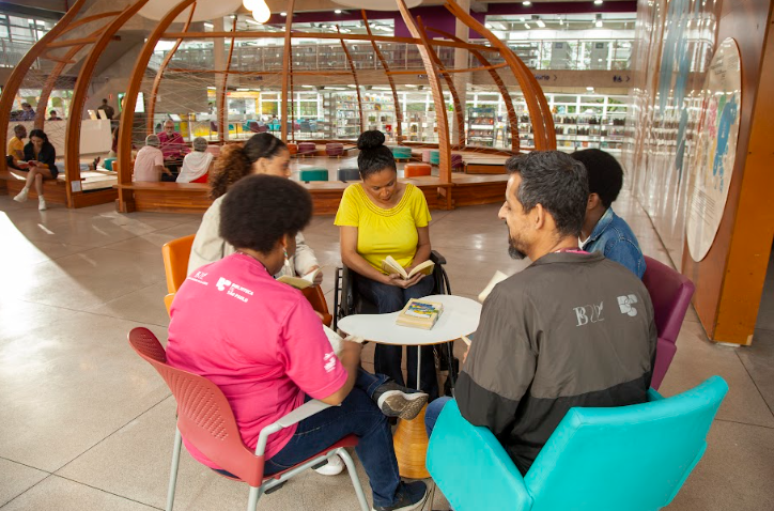Celebrating reading means recognizing its therapeutic potential and its contribution to individual and collective well-being
Public libraries are not just places to consult books; they function as real reception and exchange spaces.
The National Library of Brazil, in Rio de Janeiro, was founded in 1810. More than 200 years later, reading has established itself as a powerful tool for promoting emotional and mental well-being, through so-called bibliotherapy. This term, used for decades, has never been as current as it is now. After all, our society is experiencing a time when the population is facing increasing levels of anxiety and depression.
According to data from the World Health Organization (WHO), depression affects more than 300 million people worldwide. Anxiety disorder affects approximately 264 million people. In Brazil the scenario is worrying: we are the country with the highest rate of anxious people in the world and the fifth in terms of number of cases of depression. This landscape reinforces the urgency of seeking alternatives for mental health care. In this sense, reading appears as a “natural medicine”, which offers benefits to people of all ages.
Reading as a healthy alternative
Bibliotherapy is the practice of using the reading of books, stories, poems or other literary texts as a therapeutic resource. Promote reflection, stress relief and personal development. Just like a physical relaxation exercise, reading can calm the mind, reduce symptoms of anxiety, and help people process difficult emotions. In some countries, such as the United Kingdom, the National Health System (NHS) already operates “social prescribing” programs, which include recommending specific books to help treat mental health problems.
Research from the University of Sussex shows that reading can reduce levels of cortisol, a hormone associated with stress, by up to 68%. Just read for just six minutes to start relaxing your body and mind. This helps slow down the hectic pace of daily life. This practice promotes the development of empathy, improves concentration and offers new perspectives on life, allowing the reader to come into contact with other realities and better understand their emotions.
Libraries emerge as welcoming spaces
Libraries are not just places to consult books; they function as real reception and exchange spaces. In times of great turmoil, they provide an environment where you can slow down, reflect, and seek moments of new experiences. The practice of bibliotherapy can be enhanced in spaces like these, where organization and contact with books and people help create an environment of comfort and well-being.
The São Paulo Library (BSP) and the Parque Villa-Lobos Library (BVL), in the capital of São Paulo, are examples of places that integrate reading with caring for people. In addition to promoting access to books, they offer programs that can help promote mental health. Such as, for example, reading clubs and storytelling workshops, which encourage meeting, sharing experiences and mutual support.
Just like BibliON, the free digital library of São Paulo, which brings reading to different places, it is an alternative that breaks down physical barriers. Therefore, it allows more people to have access to the benefits of reading as a therapeutic practice. The presence of digital libraries in places with less cultural infrastructure makes bibliotherapy accessible, democratizing this alternative to emotional care.
Benefits for health and personal development
In addition to the mental health benefits, reading contributes significantly to personal development. Improve your ability to concentrate, expand your vocabulary and stimulate critical thinking. The act of reading regularly involves a sort of “mental gymnastics” which, like physical exercise, brings lasting benefits.
We cannot forget that, in an increasingly digital and isolated society, libraries offer a common space, where the public can meet for cultural and social activities. Reading clubs and literary workshops, for example, are not just moments of leisure. It’s also about building bonds, welcoming and fighting isolation. These spaces allow people to share their stories and feelings. These exchanges go beyond written words and contribute to collective mental health.
Faced with the challenges that mental health poses to today’s society, bibliotherapy emerges as a valuable and accessible practice. By promoting reading in welcoming spaces and democratizing access to books, libraries like São Paulo and Parque Villa-Lobos, as well as initiatives like BibliON, play an important role in building a healthier society. On National Book Day, celebrating reading means recognizing its therapeutic potential and its contribution to individual and collective well-being.
Reading, therefore, is not just a form of entertainment or cultural enrichment. It is like a true ally in the care of the mind and heart, helping to face the challenges of an increasingly complex and frenetic world.
Source: Terra
Ben Stock is a lifestyle journalist and author at Gossipify. He writes about topics such as health, wellness, travel, food and home decor. He provides practical advice and inspiration to improve well-being, keeps readers up to date with latest lifestyle news and trends, known for his engaging writing style, in-depth analysis and unique perspectives.









